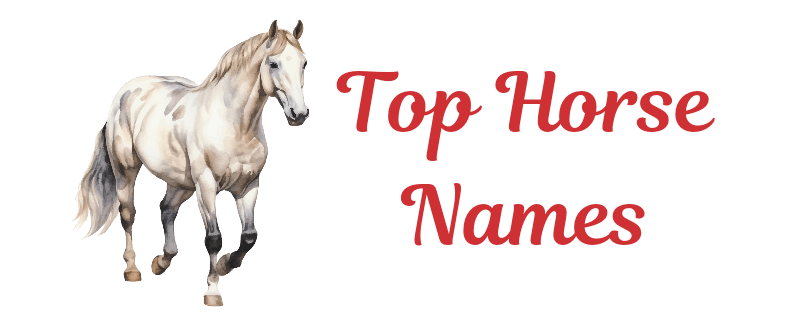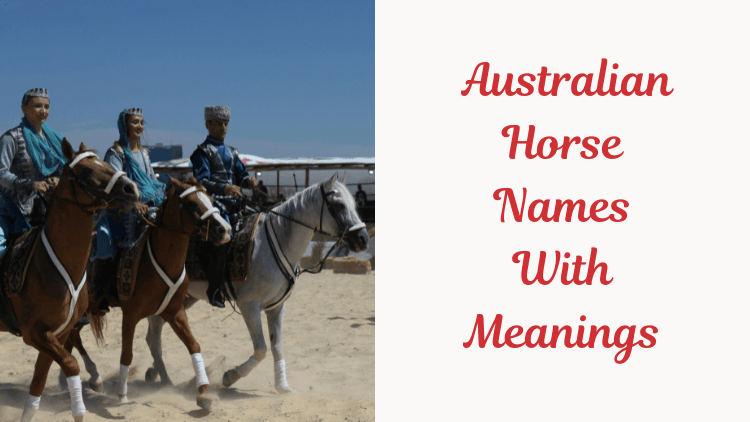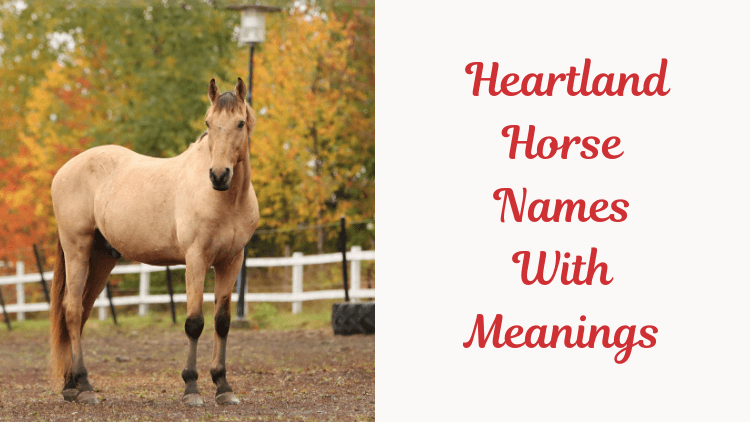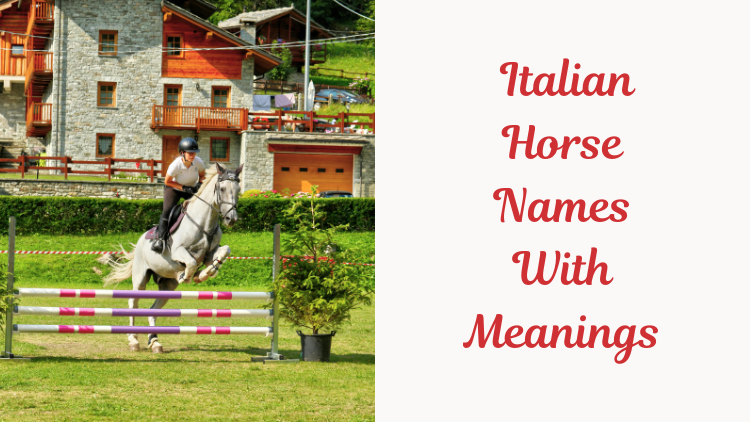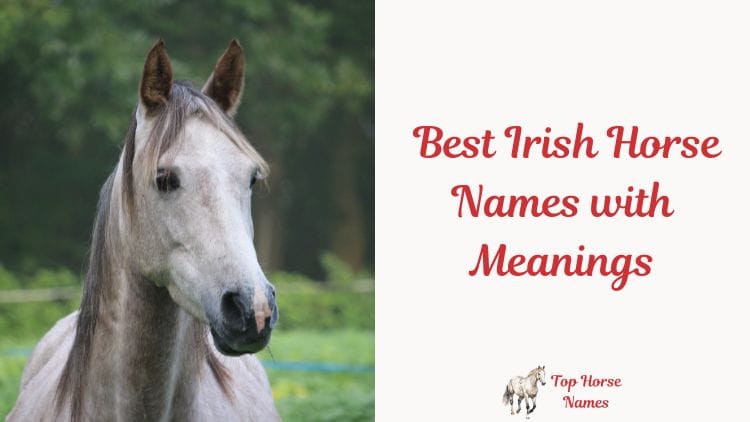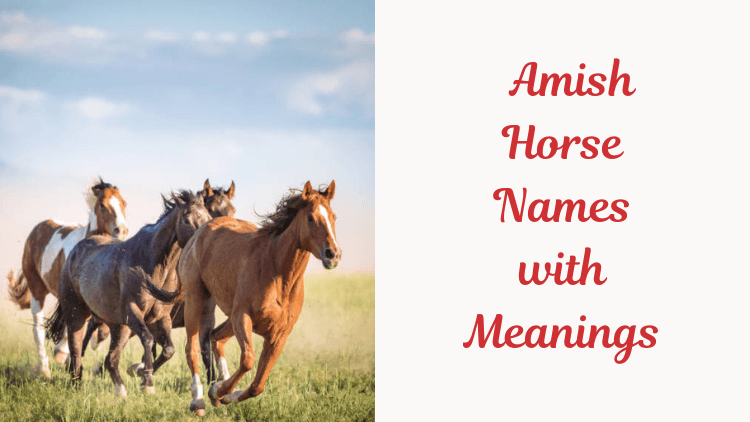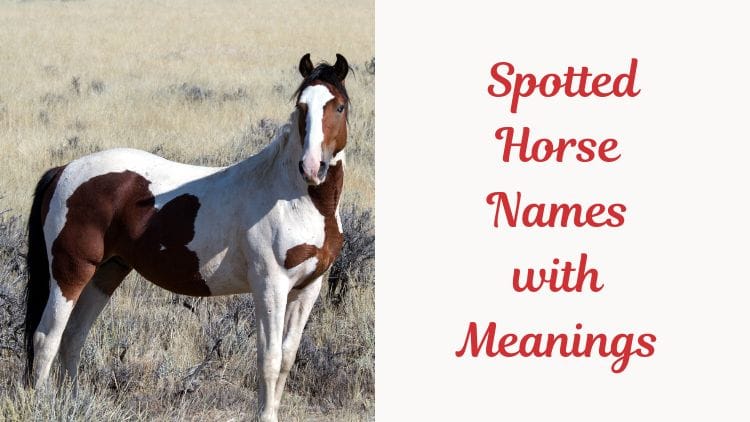191 Japanese Horse Names with Meanings
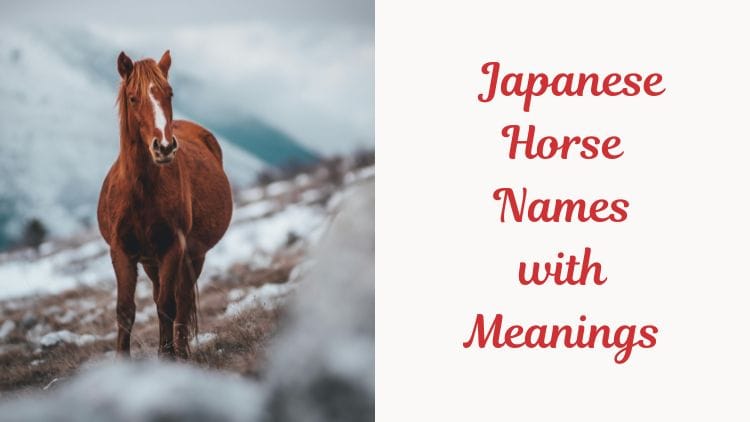
Choosing a name for your horse is an exciting step, and Japanese horse names offer a unique blend of beauty, meaning, and tradition.
These names are inspired primarily from nature, mythology, and Japanese culture, making them a perfect fit for horses with noble or graceful qualities.
Why Choose Japanese Names for Your Horse
Japanese names are more than just aesthetically pleasing; they carry deep cultural significance. Many names are connected to elements of nature, gods, and virtues, adding a layer of meaning.
They also tend to sound elegant and are easy to pronounce, even for those unfamiliar with the language. Additionally, Japanese names are unique, making them stand out and giving your horse a distinctive identity.
Popular Categories of Japanese Horse Names
Traditional Names
Names like Hana (Flower) and Kage (Shadow) are common choices, evoking beauty and strength. These names often reflect natural elements and are simple yet elegant.
Mythological and Legendary Names
Inspired by Japanese mythology, names like Raijin (God of Thunder) and Sora (Sky) carry powerful meanings, often linked to gods and legendary figures, perfect for a horse with a strong, commanding presence.
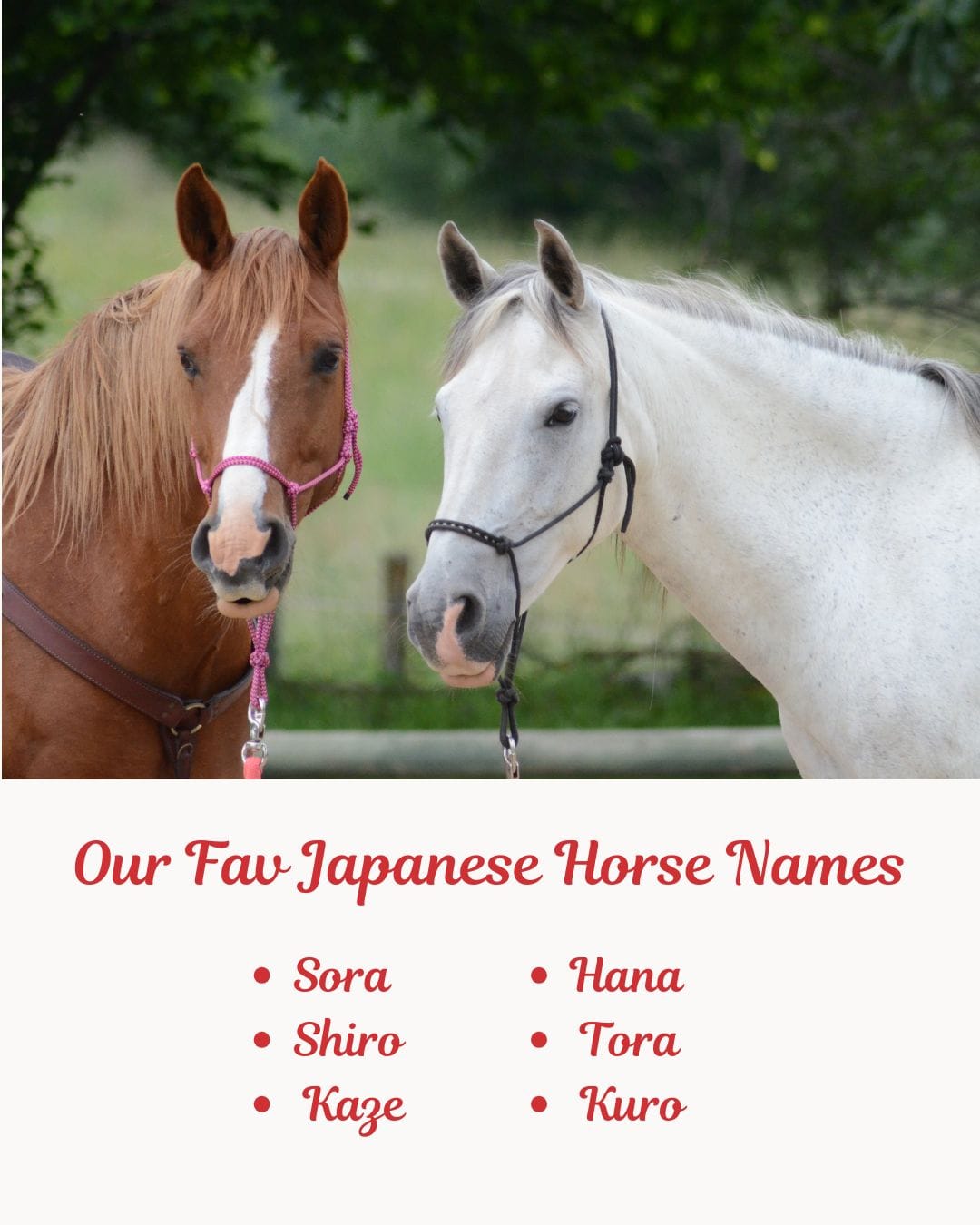
Our Best Names Picks
1. Hikari (hee-kah-ree) – Means “light” in Japanese, perfect for a radiant and swift horse.
2. Sora (soh-rah) – Meaning “sky,” ideal for a horse with boundless energy.
3. Kaze (kah-zeh) – Signifies “wind,” great for a fast and agile horse.
4. Yuki (yoo-kee) – Means “snow,” a fitting name for a white or calm-natured horse.
5. Aka (ah-kah) – Meaning “red,” for a bold or spirited horse.
6. Shiro (shee-roh) – Translates to “white,” suited for a pure or elegant horse.
7. Kuro (koo-roh) – Means “black,” ideal for a dark-coated horse.
8. Tora (toh-rah) – Meaning “tiger,” perfect for a powerful or striking horse.
9. Mizu (mee-zoo) – Means “water,” for a graceful and flowing horse.
10. Hana (hah-nah) – Signifies “flower,” a lovely name for a gentle and beautiful horse.
30 My Favorite Japanese Horse Names
Japanese horse names are full of elegance, strength, and cultural meaning, making them truly special choices for any horse.
Some of my favorites include Kaze (風, meaning “wind”) for its sense of freedom and speed, Yuki (雪, meaning “snow”) for its serene beauty, and Raiden (雷電, meaning “thunder”) for a bold, powerful spirit.
These names not only sound unique but also reflect qualities that honor the horse’s personality and presence, making them unforgettable.
1. Akihiko
Pronunciation: Ah-kee-hee-ko
Meaning: Bright prince or shining child
Origin & Usage: Of Japanese origin, this name combines “aki” (bright) and “hiko” (prince/child). It’s a strong, noble name perfect for a majestic male horse.
2. Haruto
Pronunciation: Hah-roo-toh
Meaning: Sunlight or springtime person
Origin & Usage: A popular Japanese name, Haruto evokes warmth and renewal, making it ideal for a vibrant, lively horse with a sunny disposition.
3. Yuki
Pronunciation: Yoo-kee
Meaning: Snow or happiness
Origin & Usage: Depending on the kanji, Yuki can mean “snow” or “happiness.” It suits a graceful white horse or one that brings joy.
4. Kaze
Pronunciation: Kah-zeh
Meaning: Wind
Origin & Usage: Derived from nature, Kaze symbolizes speed and freedom. It’s ideal for a swift and agile horse.
5. Sakura
Pronunciation: Sah-koo-rah
Meaning: Cherry blossom
Origin & Usage: Representing beauty and renewal, Sakura is perfect for a female horse with a delicate or elegant nature.
6. Tatsu
Pronunciation: Tah-tsoo
Meaning: Dragon
Origin & Usage: A powerful name associated with strength and resilience. Tatsu is fitting for a commanding horse with a spirited personality.
7. Shiro
Pronunciation: Shee-roh
Meaning: White
Origin & Usage: Commonly used for pure white animals, Shiro is a simple and classic name for a snowy or light-colored horse.
8. Hikari
Pronunciation: Hee-kah-ree
Meaning: Light or radiance
Origin & Usage: Often associated with positivity and hope, Hikari suits a luminous and graceful horse.
9. Riku
Pronunciation: Ree-koo
Meaning: Land or earth
Origin & Usage: Rooted in nature, Riku is ideal for a sturdy, reliable horse with a grounded personality.
10. Sora
Pronunciation: Soh-rah
Meaning: Sky
Origin & Usage: Symbolizing freedom and vastness, Sora is perfect for a horse that loves to roam and embodies independence.
11. Shinju
Pronunciation: Sheen-joo
Meaning: Pearl or treasure
Origin & Usage: A delicate, meaningful name suited for a cherished horse with a precious bond with its owner.
12. Kuro
Pronunciation: Koo-roh
Meaning: Black
Origin & Usage: Perfect for dark-coated horses, Kuro is a straightforward and elegant choice.
13. Ren
Pronunciation: Rehn
Meaning: Lotus or love
Origin & Usage: Representing purity and rebirth, Ren fits a calm and serene horse.
14. Michi
Pronunciation: Mee-chee
Meaning: Path or way
Origin & Usage: Symbolizing guidance, Michi is ideal for a horse with a purposeful or guiding spirit.
15. Kaida
Pronunciation: Kye-dah
Meaning: Little Dragon
Origin & Usage: A unique name that conveys both strength and endearment. It’s perfect for a small but spirited horse.
16. Aoi
Pronunciation: Ah-oh-ee
Meaning: Hollyhock or blue
Origin & Usage: Often symbolizing calmness and beauty, Aoi is great for a serene or visually striking horse.
17. Hoshi
Pronunciation: Ho-shee
Meaning: Star
Origin & Usage: Representing brilliance and guidance, Hoshi is a fitting name for a horse that shines in its abilities or appearance.
18. Kenta
Pronunciation: Ken-tah
Meaning: Healthy and strong
Origin & Usage: A robust name suitable for a powerful and energetic male horse.
19. Amaya
Pronunciation: Ah-my-ah
Meaning: Night rain
Origin & Usage: A poetic name that suits a calm, mysterious, or dark-coated horse.
20. Tsubasa
Pronunciation: Tsoo-bah-sah
Meaning: Wings
Origin & Usage: Symbolizing freedom and speed, Tsubasa is perfect for a fast, free-spirited horse.
21. Ryuu
Pronunciation: Ree-yoo
Meaning: Dragon
Origin & Usage: A bold name that exudes strength, courage, and majesty. Ideal for a dominant stallion.
22. Hana
Pronunciation: Hah-nah
Meaning: Flower
Origin & Usage: Representing beauty and grace, Hana is an elegant name for a female horse.
23. Mitsu
Pronunciation: Mee-tsoo
Meaning: Light or honey
Origin & Usage: A sweet name with a warm, glowing connotation. Ideal for a kind-natured horse.
24. Kuma
Pronunciation: Koo-mah
Meaning: Bear
Origin & Usage: While associated with strength and protection, Kuma is a unique name for a large, gentle horse.
25. Ryo
Pronunciation: Ree-oh
Meaning: Dragon or excellent
Origin & Usage: A versatile name for a noble, strong, or exceptional horse.
26. Izumi
Pronunciation: Ee-zoo-mee
Meaning: Fountain or spring
Origin & Usage: This nature-inspired name suits a lively and refreshing horse.
27. Daichi
Pronunciation: Dah-ee-chee
Meaning: Great land or earth
Origin & Usage: Perfect for a reliable and grounded horse with a steady personality.
28. Akira
Pronunciation: Ah-kee-rah
Meaning: Bright or clear
Origin & Usage: A gender-neutral name that signifies clarity and brilliance. Great for a radiant horse.
29. Mei
Pronunciation: May
Meaning: Bud or sprout
Origin & Usage: A delicate name symbolizing growth and new beginnings. Ideal for a young or spirited horse.
30. Kiyoshi
Pronunciation: Kee-yoh-shee
Meaning: Pure or serene
Origin & Usage: A calming name that fits a peaceful, gentle horse.
30 Japanese Race Horse Names
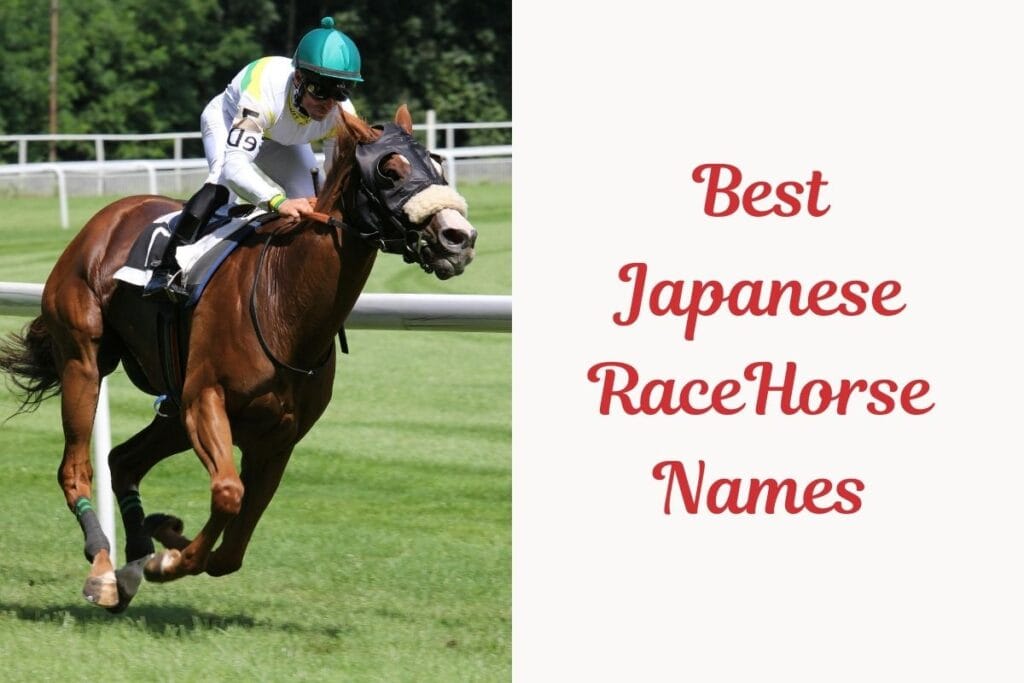
Japanese racehorse names are often unique, and powerful, and carry deep meanings that reflect the spirit and strength of these incredible athletes. Drawing from Japanese language, culture, and symbolism, these names may evoke elements of nature, historical figures, or values like courage and speed.
Names such as Deep Impact and Kitasan Black have gained global recognition, capturing both the power and elegance associated with Japan’s finest racehorses.
Japanese naming conventions for racehorses often aim to inspire confidence and respect, while paying homage to the country’s traditions and natural beauty.
1. Hikari
Pronunciation: hee-kah-ree
Meaning: Light or radiance
Origin & Usage: This name reflects brilliance and speed, often chosen for swift and luminous racehorses.
2. Kaze no Yaiba
Pronunciation: kah-zeh noh yah-ee-bah
Meaning: Blade of the wind
Origin & Usage: Represents sharpness and agility, suitable for a horse that cuts through the race with precision.
3. Midori no Hikari
Pronunciation: mee-doh-ree noh hee-kah-ree
Meaning: Green light
Origin & Usage: Symbolic of growth and energy, inspired by lush fields and open skies.
4. Ryuusei
Pronunciation: ryu-seh-ee
Meaning: Shooting star
Origin & Usage: Perfect for a horse with extraordinary speed and an unstoppable streak.
5. Arashi
Pronunciation: ah-rah-shee
Meaning: Storm
Origin & Usage: A powerful name for a fierce and unstoppable racehorse.
6. Akatsuki
Pronunciation: ah-kah-tsu-kee
Meaning: Dawn
Origin & Usage: Ideal for a horse with a bright future, symbolizing new beginnings.
7. Yūki
Pronunciation: yoo-kee
Meaning: Courage
Origin & Usage: Reflects a horse with a brave and tenacious spirit.
8. Fubuki
Pronunciation: foo-boo-kee
Meaning: Snowstorm
Origin & Usage: Captures a sense of intensity and beauty, often for horses with a bold presence.
9. Tsubasa
Pronunciation: tsu-bah-sah
Meaning: Wings
Origin & Usage: Symbolizes freedom and speed, popular among racing champions.
10. Kanade
Pronunciation: kah-nah-deh
Meaning: Melody
Origin & Usage: Represents harmony and grace, fitting for elegant racers.
11. Kazan
Pronunciation: kah-zahn
Meaning: Volcano
Origin & Usage: Implies explosive energy and a fierce racing style.
12. Haruka
Pronunciation: hah-roo-kah
Meaning: Distant or far-reaching
Origin & Usage: Perfect for a horse known for endurance and a long racing career.
13. Raijin
Pronunciation: rah-ee-jeen
Meaning: God of thunder
Origin & Usage: A bold name invoking strength and dominance in racing fields.
14. Shiranui
Pronunciation: shee-rah-noo-ee
Meaning: Mysterious lights
Origin & Usage: Often given to enigmatic horses with unpredictable yet brilliant performances.
15. Suzaku
Pronunciation: soo-zah-koo
Meaning: Vermilion bird
Origin & Usage: Inspired by Japanese mythology, symbolizing a fiery and spirited racer.
16. Kumo no Mai
Pronunciation: koo-moh noh my
Meaning: Dance of the clouds
Origin & Usage: Represents grace and fluid movement, ideal for an elegant horse.
17. Hōō
Pronunciation: ho-oh
Meaning: Phoenix
Origin & Usage: A mythical bird, this name suggests renewal and invincibility.
18. Kuro no Kaze
Pronunciation: koo-roh noh kah-zeh
Meaning: Black wind
Origin & Usage: Reflects speed and mystery, often for sleek, dark-coated horses.
19. Sora no Tsubasa
Pronunciation: soh-rah noh tsu-bah-sah
Meaning: Wings of the sky
Origin & Usage: Perfect for a horse known for soaring above the competition.
20. Taiga
Pronunciation: tah-ee-gah
Meaning: Great river
Origin & Usage: Suggests strength, flow, and unstoppable energy.
21. Ginga
Pronunciation: geen-gah
Meaning: Galaxy
Origin & Usage: Symbolizes vast potential and shining brilliance on the track.
22. Sakura no Kaze
Pronunciation: sah-koo-rah noh kah-zeh
Meaning: Cherry blossom wind
Origin & Usage: Represents beauty and fleeting speed, akin to cherry blossoms in bloom.
23. Homura
Pronunciation: hoh-moo-rah
Meaning: Flame
Origin & Usage: Evokes passion and an intense racing spirit.
24. Ryūjin
Pronunciation: ryu-jeen
Meaning: Dragon god
Origin & Usage: A mythical name suggesting power and dominance on the track.
25. Kurenai
Pronunciation: koo-reh-nah-ee
Meaning: Crimson
Origin & Usage: Symbolic of fiery determination and boldness in races.
26. Amaterasu
Pronunciation: ah-mah-teh-rah-soo
Meaning: Sun goddess
Origin & Usage: Inspired by the Shinto deity, signifying brilliance and leadership.
27. Yukikaze
Pronunciation: yoo-kee-kah-zeh
Meaning: Snow wind
Origin & Usage: This represents a swift and serene racer, akin to a snowstorm’s grace.
28. Seiryū
Pronunciation: say-ryoo
Meaning: Azure dragon
Origin & Usage: From mythology, a name for strong, majestic horses.
29. Kaen
Pronunciation: kah-ehn
Meaning: Blaze
Origin & Usage: Suggests fiery energy and an unstoppable spirit.
30. Hibiki
Pronunciation: hee-bee-kee
Meaning: Echo or resonance
Origin & Usage: Represents impact and the enduring legacy of a remarkable racehorse.
50 Traditional Japanese Horse Names
Ancient customs, nature, and the values of honor and strength often inspire traditional Japanese horse names.
Seasons, animals, and spiritual concepts are often reflected in horse names, each with symbolic meanings associated with that horse.
For example, names like Yamato evoke Japan’s historical spirit, while Kuro (black) and Aoi (blue) represent natural colors.
These names not only sound unique but also connect to Japan’s cultural heritage, making them meaningful choices for horse owners who appreciate tradition.
The owners of horses can give their animals a timeless, dignified identity by selecting a traditional Japanese name.
1. Akane
Pronunciation: Ah-kah-neh
Meaning: Deep red or crimson
Origin & Usage: Akane is associated with the vibrant hues of the sunset, symbolizing strength and beauty. It’s a poetic name often tied to nature’s fiery energy.
2. Kaede
Pronunciation: Kah-eh-deh
Meaning: Maple tree
Origin & Usage: Kaede is a beloved name in Japan, reflecting the grace of autumn leaves. It’s fitting for a horse with a calm yet noble temperament.
3. Haruto
Pronunciation: Hah-roo-toh
Meaning: Sunlight; spring
Origin & Usage: Haruto represents hope and renewal, ideal for a spirited horse. It’s a popular Japanese name with deep ties to seasonal beauty.
4. Yūga
Pronunciation: Yoo-gah
Meaning: Elegance or grace
Origin & Usage: Yūga signifies refined beauty and is used for horses known for their majestic movements and poise.
5. Tsubaki
Pronunciation: Tsoo-bah-kee
Meaning: Camellia flower
Origin & Usage: A traditional name linked to endurance and admiration, Tsubaki is perfect for resilient and striking horses.
6. Hayate
Pronunciation: Hah-yah-teh
Meaning: Swift wind
Origin & Usage: Hayate captures the speed and agility of a horse, making it a popular choice for racehorses in Japanese culture.
7. Kumo
Pronunciation: Koo-moh
Meaning: Cloud
Origin & Usage: Kumo symbolizes freedom and grace, suitable for a horse with a light and fluid gait.
8. Raiden
Pronunciation: Rye-den
Meaning: Thunder god
Origin & Usage: Associated with power and dominance, Raiden is ideal for a strong and commanding horse.
9. Sakura
Pronunciation: Sah-koo-rah
Meaning: Cherry blossom
Origin & Usage: Sakura represents fleeting beauty and renewal, often chosen for gentle and graceful horses.
10. Isamu
Pronunciation: Ee-sah-moo
Meaning: Courage or bravery
Origin & Usage: A traditional male name, Isamu is perfect for a fearless and steadfast horse.
11. Shiro
Pronunciation: Shee-roh
Meaning: White
Origin & Usage: Shiro reflects purity and simplicity, often used for white or pale-colored horses.
12. Renji
Pronunciation: Ren-jee
Meaning: Lotus
Origin & Usage: Renji signifies spiritual growth and is a poetic name for a serene and steady horse.
13. Takara
Pronunciation: Tah-kah-rah
Meaning: Treasure
Origin & Usage: Takara is used to denote a cherished horse, one that is deeply valued and loved.
14. Mizuki
Pronunciation: Mee-zoo-kee
Meaning: Beautiful moon
Origin & Usage: This name reflects a horse with elegance and mystery, often linked to the moon’s ethereal charm.
15. Kitsune
Pronunciation: Kee-tsoo-neh
Meaning: Fox
Origin & Usage: Kitsune symbolizes cleverness and agility, fitting for a swift and cunning horse.
16. Name: Ame
Pronunciation: Ah-meh
Meaning: Rain
Origin & Usage: Ame signifies tranquility and life-giving power, ideal for a calm and nurturing horse.
17. Ryū
Pronunciation: Ree-yoo
Meaning: Dragon
Origin & Usage: A name that conveys power and majesty, Ryū is perfect for a bold and awe-inspiring horse.
18. Hikari
Pronunciation: Hee-kah-ree
Meaning: Light
Origin & Usage: Hikari embodies hope and guidance, making it a suitable name for a horse with a radiant personality.
19. Kaze
Pronunciation: Kah-zeh
Meaning: Wind
Origin & Usage: Kaze captures the untamed spirit of nature, perfect for a horse known for its speed and freedom.
20. Yuki
Pronunciation: Yoo-kee
Meaning: Snow
Origin & Usage: Yuki reflects purity and calmness, often used for a horse with a serene demeanor.
21. Aoi
Pronunciation: Ah-oh-ee
Meaning: Hollyhock flower
Origin & Usage: Aoi symbolizes elegance and prosperity. It’s a gentle yet timeless name, ideal for a graceful horse.
22. Kuro
Pronunciation: Koo-roh
Meaning: Black
Origin & Usage: Kuro is a classic name for black-coated horses, embodying mystery and strength.
23. Hana
Pronunciation: Hah-nah
Meaning: Flower
Origin & Usage: Hana represents beauty and vitality, making it suitable for a lively and charming horse.
24. Tora
Pronunciation: Toh-rah
Meaning: Tiger
Origin & Usage: Tora signifies courage and power, often chosen for bold and fearless horses.
25. Riku
Pronunciation: Ree-koo
Meaning: Land
Origin & Usage: Riku reflects stability and grounding, ideal for a dependable and steadfast horse.
26. Suzu
Pronunciation: Soo-zoo
Meaning: Bell
Origin & Usage: Suzu is a delicate name symbolizing harmony and joy, often used for gentle and cheerful horses.
27. Gin
Pronunciation: Geen
Meaning: Silver
Origin & Usage: Gin is associated with elegance and refinement, perfect for a horse with a shiny or light-colored coat.
28. Shin
Pronunciation: Sheen
Meaning: True or genuine
Origin & Usage: Shin embodies honesty and authenticity, suitable for a loyal and trustworthy horse.
29. Asahi
Pronunciation: Ah-sah-hee
Meaning: Morning sun
Origin & Usage: Asahi symbolizes hope and a fresh start, ideal for a vibrant and spirited horse.
30. Kitsunebi
Pronunciation: Kit-soo-neh-bee
Meaning: Fox fire
Origin & Usage: Kitsunebi is a mystical name linked to folklore, ideal for a horse with a mysterious aura.
31. Momo
Pronunciation: Moh-moh
Meaning: Peach
Origin & Usage: Momo is a charming and affectionate name, often used for a sweet and gentle horse.
32. Fuji
Pronunciation: Foo-jee
Meaning: Wisteria or Mount Fuji
Origin & Usage: Fuji represents strength and serenity, perfect for a horse with a regal presence.
33. Rai
Pronunciation: Rye
Meaning: Lightning
Origin & Usage: Rai captures speed and intensity, ideal for a fast and energetic horse.
34. Nami
Pronunciation: Nah-mee
Meaning: Wave
Origin & Usage: Nami reflects fluidity and grace, suitable for a horse with a smooth and flowing stride.
35. Tsuki
Pronunciation: Tsoo-kee
Meaning: Moon
Origin & Usage: Tsuki symbolizes mystery and calm, perfect for a serene and enigmatic horse.
36. Hoshi
Pronunciation: Ho-shee
Meaning: Star
Origin & Usage: Hoshi conveys brilliance and guidance, ideal for a standout horse.
37. Akarui
Pronunciation: Ah-kah-roo-ee
Meaning: Bright
Origin & Usage: Akarui signifies positivity and vitality, perfect for a cheerful and lively horse.
38. Kibou
Pronunciation: Kee-boh
Meaning: Hope
Origin & Usage: Kibou embodies optimism and aspiration, fitting for a horse that inspires its owner.
39. Umi
Pronunciation: Oo-mee
Meaning: Sea
Origin & Usage: Umi represents depth and calm, ideal for a horse with a steady temperament.
40. Hinata
Pronunciation: Hee-nah-tah
Meaning: Sunflower or sunny place
Origin & Usage: Hinata symbolizes warmth and happiness, making it a delightful name for a radiant horse.
41. Arashi
Pronunciation: Ah-rah-shee
Meaning: Storm
Origin & Usage: Arashi captures raw power and energy, suitable for a strong and spirited horse.
42. Souta
Pronunciation: Soh-tah
Meaning: Sound of the wind
Origin & Usage: Souta reflects calmness and harmony, ideal for a horse with a gentle yet dynamic presence.
43. Tamashii
Pronunciation: Tah-mah-shee
Meaning: Soul
Origin & Usage: Tamashii represents depth and spirit, suitable for a horse with a soulful and meaningful connection to its rider.
44. Hibiki
Pronunciation: Hee-bee-kee
Meaning: Echo
Origin & Usage: Hibiki signifies resonance and impact, perfect for a horse that leaves a lasting impression.
45. Ren
Pronunciation: Rehn
Meaning: Lotus or love
Origin & Usage: Ren embodies purity and affection, making it ideal for a beloved horse.
46. Tsubasa
Pronunciation: Tsoo-bah-sah
Meaning: Wings
Origin & Usage: Tsubasa signifies freedom and flight, perfect for a horse known for its swiftness and agility.
47. Nozomi
Pronunciation: Noh-zoh-mee
Meaning: Wish or hope
Origin & Usage: Nozomi is a name full of aspirations, suitable for a horse that represents dreams coming true.
48. Kouki
Pronunciation: Koh-kee
Meaning: Radiant light
Origin & Usage: Kouki conveys brilliance and optimism, making it an excellent name for a lively horse.
49. Amefuri
Pronunciation: Ah-meh-foo-ree
Meaning: Rainfall
Origin & Usage: Amefuri reflects serenity and the life-giving power of nature, ideal for a calm and nurturing horse.
50. Yuzuki
Pronunciation: Yoo-zoo-kee
Meaning: Gentle moon
Origin & Usage: Yuzuki signifies grace and tranquility, perfect for a horse with a soothing and peaceful demeanor.
10 Cool & Cute Japanese Horse Names
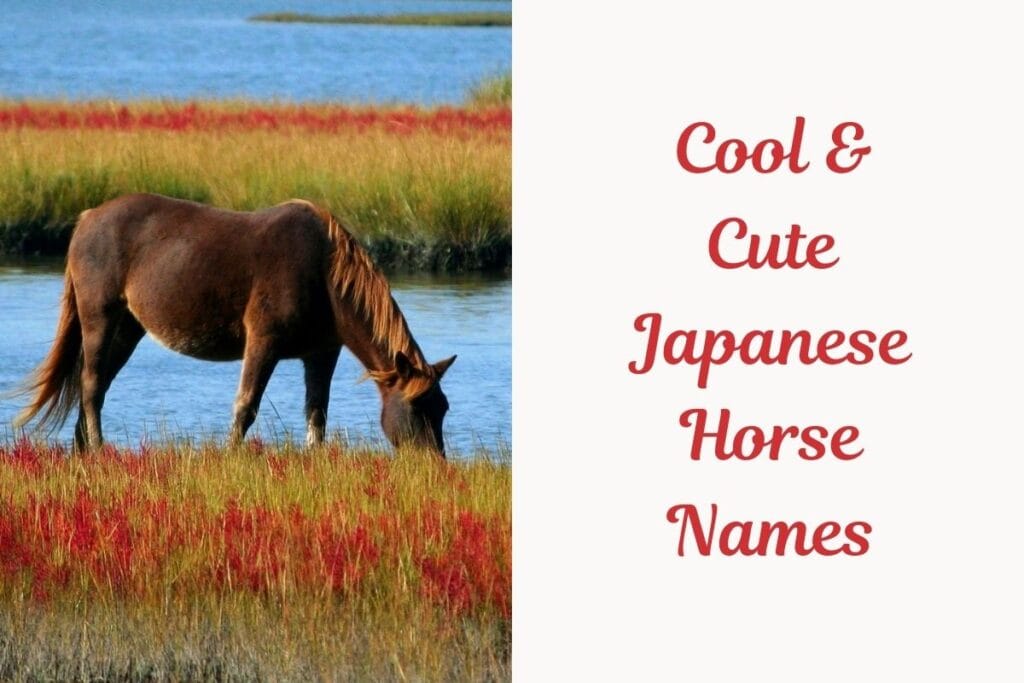
Cool and cute Japanese horse names offer a blend of charm and character, perfect for horses with unique personalities.
In the case of a spirited horse named Raiden, it means “thunder and lightning,” while Yamato, which symbolizes Japanese pride and strength, does the same for a Japanese person. Their boldness makes them memorable and meaningful.
On the other hand, cute Japanese names bring out a horse’s gentle and playful side. Names like Hana (花, meaning “flower”) or Mochi (餅, meaning “rice cake”) are soft, endearing choices that suit friendly, lovable horses. These names are simple yet heartwarming, highlighting a horse’s charm.
A Japanese name can be powerful or sweet, depending on your preferences.
This list of cool and cute names is the perfect way to let your horse’s unique personality shine through.
1. Kageyama
Pronunciation: Kah-geh-yah-mah
Meaning: “Shadow Mountain”
Origin & Usage: A unique name blending nature and mystery, often associated with strong horses that thrive in challenging terrains. It evokes the image of a horse galloping through misty mountain shadows, showcasing resilience.
2. Tsubaki
Pronunciation: Tsoo-bah-kee
Meaning: “Camellia (Flower)”
Origin & Usage: This name symbolizes beauty, grace, and strength. Often chosen for horses with a delicate yet powerful presence, the camellia flower is a symbol of admiration and purity in Japanese culture.
3. Suzume
Pronunciation: Soo-zoo-meh
Meaning: “Sparrow”
Origin & Usage: A light, airy name often given to fast and nimble horses. The sparrow, known for its agility, reflects a horse’s quick movements and cleverness, making it an ideal name for swift steeds.
4. Raiden
Pronunciation: Rye-den
Meaning: “Thunder and Lightning”
Origin & Usage: This powerful name evokes the force of nature. Typically used for strong and energetic horses, it’s inspired by the god of thunder in Japanese mythology and embodies both power and energy.
5. Hana
Pronunciation: Hah-nah
Meaning: “Flower”
Origin & Usage: A simple, elegant name often given to horses that embody beauty and charm. “Hana” is popular for female horses, symbolizing purity, grace, and the fleeting beauty of life.
6. Kuro
Pronunciation: Koo-roh
Meaning: “Black”
Origin & Usage: This name is perfect for a dark-colored horse. “Kuro” is a strong and bold name that reflects the horse’s dark coat, often given to horses with a powerful and mysterious presence.
7. Yuki
Pronunciation: Yoo-kee
Meaning: “Snow”
Origin & Usage: A serene and peaceful name, perfect for a white or light-colored horse. “Yuki” conjures images of snowy landscapes, and is often used for horses that embody purity, calmness, and elegance.
8. Kumo
Pronunciation: Koo-moh
Meaning: “Cloud”
Origin & Usage: Light and dreamy, this name is often chosen for horses with a soft, flowing mane or a calm demeanor. It symbolizes freedom and grace, like a horse drifting through the skies.
9. Sora
Pronunciation: Soh-rah
Meaning: “Sky”
Origin & Usage: A name reflecting vastness and ambition. Often given to horses that exhibit great potential or a lofty, majestic presence, “Sora” is used to symbolize the limitless horizon and the freedom of the skies.
10. Tora
Pronunciation: Toe-rah
Meaning: “Tiger”
Origin & Usage: A fierce and bold name, typically given to horses with a strong, brave, or wild nature. “Tora” is inspired by the tiger, representing power, agility, and dominance in its natural form.
15 Male Japanese Horse Names
Male Japanese horse names often reflect qualities like strength, courage, and wisdom, making them fit for a powerful or spirited horse.
These names may draw inspiration from Japanese mythology, historical figures, or nature.
For instance, Raiden (雷電) means “thunder and lightning,” which suits a bold or energetic stallion, while Kenji (賢治) combines “wisdom” and “rule,” conveying intelligence and leadership.
Male Japanese names not only sound distinct but also give your horse a meaningful identity rooted in cultural heritage.
1. Kagekatsu
Pronunciation: Kah-geh-kaht-su
Meaning: Victorious shadow
Origin & Usage: Rooted in Japanese samurai culture, this name symbolizes resilience and triumph. Often associated with strength and honor, it is suitable for a horse with a commanding presence and strong will.
2. Haruto
Pronunciation: Hah-roo-toh
Meaning: Soaring sun or sunlight
Origin & Usage: A popular Japanese male name, “Haruto” evokes warmth and positivity. Perfect for a swift and agile horse that embodies grace and energy.
3. Ryoma
Pronunciation: Ryoh-mah
Meaning: Dragon horse
Origin & Usage: This name references mythological creatures and the legendary samurai Ryoma Sakamoto. It’s ideal for a horse of noble lineage or one with a fiery spirit.
4. Takumi
Pronunciation: Tah-koo-mee
Meaning: Artisan or master
Origin & Usage: Reflecting skill and dedication, this name is well-suited for a horse known for its precision and determination in races or tasks.
5. Masaru
Pronunciation: Mah-sah-roo
Meaning: Victory
Origin & Usage: Associated with success and accomplishment, “Masaru” is a fitting name for a competitive horse with a history of winning.
6. Daiki
Pronunciation: Dah-ee-kee
Meaning: Great radiance or great tree
Origin & Usage: This name suggests stability and brilliance, making it perfect for a majestic horse with an imposing yet calm demeanor.
7. Kenta
Pronunciation: Ken-tah
Meaning: Healthy and strong
Origin & Usage: Popular among boys, “Kenta” signifies physical strength and vitality, ideal for a robust and enduring horse.
8. Hayate
Pronunciation: Hah-yah-teh
Meaning: Swift wind
Origin & Usage: Evoking imagery of speed and freedom, this name is excellent for a fast horse that embodies the spirit of the wind.
9. Tetsuya
Pronunciation: Teh-tsu-yah
Meaning: Wise and powerful
Origin & Usage: Often linked to intellectual strength and determination, this name fits a disciplined and smart horse with a strategic edge.
10. Jiro
Pronunciation: Jee-roh
Meaning: Second son
Origin & Usage: A classic Japanese male name, “Jiro” works well for a companion horse that is loyal and steady, often paired with another.
11. Akihiko
Pronunciation: Ah-kee-hee-koh
Meaning: Bright prince
Origin & Usage: This name conveys nobility and brilliance, making it ideal for a regal and graceful horse with a shining coat.
12. Sora
Pronunciation: Soh-rah
Meaning: Sky
Origin & Usage: Commonly used for its simplicity and depth, “Sora” suits a horse with a free-spirited nature or one that thrives outdoors.
13. Katsuro
Pronunciation: Kaht-soo-roh
Meaning: Victorious son
Origin & Usage: Often associated with triumph and honor, this name is perfect for a champion racehorse with a record of excellence.
14. Raiden
Pronunciation: Rye-den
Meaning: Thunder and lightning
Origin & Usage: Inspired by the Shinto god of thunder, this powerful name fits a bold and energetic horse with an electrifying presence.
15. Hiroshi
Pronunciation: Hee-roh-shee
Meaning: Generous or prosperous
Origin & Usage: A timeless Japanese name reflecting abundance and kindness, it suits a well-loved horse known for its elegance and charm.
15 Female Japanese Horse Names
Female Japanese horse names are often inspired by beauty, nature, and grace, reflecting qualities like gentleness, strength, and elegance.
Some names, like Hana (flower) or Sakura (cherry blossom), evoke delicate yet resilient aspects of nature, while others, like Yuki (snow), convey calm and purity.
Owners can use these names to emphasize their mare’s unique character and connect with Japanese cultural symbols of beauty and femininity.
Many names also embody traits like kindness, harmony, and wisdom, making them perfect for mares with serene or nurturing personalities.
For example, Emi (blessing) and Aiko (love child) bring a sense of warmth and affection, while Shizuka (quiet) is ideal for a calm, composed mare. Female Japanese horse names blend sound and meaning beautifully, offering a poetic way to honor each horse’s individuality.
1. Akahana
Pronunciation: Ah-kah-hah-nah
Meaning: Red flower
Origin & Usage: Derived from “aka” (red) and “Hana” (flower), this name symbolizes beauty and vitality. Commonly used for horses with a spirited yet elegant personality, Akahana is also linked to nature’s charm.
2. Yuzuki
Pronunciation: Yoo-zoo-kee
Meaning: Gentle moon
Origin & Usage: This name reflects tranquility and grace, inspired by the moon’s soft glow. Perfect for calm and nurturing mares, it has roots in Japanese poetic tradition.
3. Hoshiko
Pronunciation: Ho-shee-ko
Meaning: Star Child
Origin & Usage: With “Hoshi” meaning star and “ko” meaning child, this name evokes celestial beauty and is ideal for horses admired for their luminous spirit or star-like presence in competitions.
4. Kasumi
Pronunciation: Kah-soo-mee
Meaning: Mist or haze
Origin & Usage: Reflecting ethereal beauty, Kasumi is suitable for a mare with a delicate or mysterious personality. It’s inspired by the morning mist over Japanese landscapes.
5. Amane
Pronunciation: Ah-mah-neh
Meaning: Sound of the heavens
Origin & Usage: Derived from “ama” (heaven) and “ne” (sound), this name embodies divine elegance, perfect for a horse whose presence feels celestial or harmonious.
6. Sakura
Pronunciation: Sah-koo-rah
Meaning: Cherry blossom
Origin & Usage: A quintessentially Japanese name symbolizing beauty and renewal, Sakura is perfect for a graceful and admired horse, often associated with spring.
7. Mizuki
Pronunciation: Mee-zoo-kee
Meaning: Beautiful moon or water
Origin & Usage: “Mizu” (water) and “ki” (tree or hope) combine to create a serene and elegant name, ideal for horses admired for their fluid movements or tranquil disposition.
8. Koharu
Pronunciation: Koh-hah-roo
Meaning: Small spring or late summer sun
Origin & Usage: This name evokes warmth and renewal, perfect for horses born in spring or summer. It signifies joy and is a popular choice for gentle, vibrant mares.
9. Tsubaki
Pronunciation: Tsoo-bah-kee
Meaning: Camellia flower
Origin & Usage: Symbolizing admiration and perfection, Tsubaki suits elegant mares known for their grace. The camellia is a cherished flower in Japan, associated with enduring beauty.
10. Ayaka
Pronunciation: Ah-yah-kah
Meaning: Colorful flower
Origin & Usage: With “aya” meaning color and “ka” meaning flower, Ayaka celebrates vibrancy and life. It’s ideal for spirited mares with bold or eye-catching appearances.
11. Chiharu
Pronunciation: Chee-hah-roo
Meaning: A thousand springs
Origin & Usage: This poetic name conveys enduring vitality and natural beauty. It’s perfect for a horse with a youthful, lively personality or one born in springtime.
12. Nozomi
Pronunciation: No-zoh-mee
Meaning: Hope or wish
Origin & Usage: Associated with resilience and optimism, Nozomi is a strong yet feminine name. Ideal for horses known for determination or their owner’s dreams for success.
13. Haruka
Pronunciation: Hah-roo-kah
Meaning: Distant or spring flower
Origin & Usage: This name captures the spirit of adventure and renewal. Haruka is often used for horses with a free-spirited nature or a special connection to spring.
14. Himari
Pronunciation: Hee-mah-ree
Meaning: Sunflower or warmth
Origin & Usage: Himari symbolizes brightness and energy. It’s a wonderful name for horses that bring joy or have sunny dispositions.
15. Yukina
Pronunciation: Yoo-kee-nah
Meaning: Snowflower
Origin & Usage: This elegant name blends “yuki” (snow) and “na” (flower), symbolizing beauty and grace in the cold. It’s ideal for white horses or those born in winter.
Discovering the Significance of Nature-Inspired Meanings in Horse Names such as “Moon” and “Blossom
In Japanese culture, nature holds special meaning, with names inspired by elements like the moon and blossoms symbolizing beauty, grace, and resilience. Using these names for horses gives them an added layer of depth and elegance.
Moon (月, Tsuki)
The moon, or Tsuki (月) in Japanese, symbolizes beauty, mystery, and calmness. Often celebrated in Japanese art and festivals, the moon represents serenity and quiet strength, making it a lovely name for a graceful or calm horse.
Example Names:
Tsuki (月) – “Moon”: Ideal for a gentle, mysterious horse.
Mangetsu (満月) – “Full Moon“: For a horse with a strong, rounded presence.
Blossom (花, Hana)
Blossoms, especially cherry blossoms (Sakura), symbolize beauty and the fleeting nature of life. In Japan, blossoms are celebrated each spring, representing both elegance and resilience. This makes them a meaningful choice for a beautiful and gentle horse.
Example Names:
Hana (花) – “Flower”: Perfect for a delicate and graceful horse.
Sakura (桜) – “Cherry Blossom”: Suits a horse with beauty and charm, especially a light-colored one.
Significance of the Japanese Calendar and Seasons in Naming Horses
Spring (春, Haru)
Symbolizes: Renewal, beauty, and new beginnings.
Examples:
Sakura (桜) – “Cherry Blossom”: A classic spring symbol, ideal for a beautiful, graceful horse.
Haru (春) – “Spring”: A joyful name, suitable for an energetic and lively horse.
Summer (夏, Natsu)
Symbolizes: Energy, warmth, and growth.
Examples:
Natsu (夏) – “Summer”: Represents vibrancy, ideal for an enthusiastic horse.
Aozora (青空) – “Blue Sky”: Captures the clear summer skies, suitable for a bright, spirited horse.
Autumn (秋, Aki)
Symbolizes: Reflection, harvest, and maturity.
Examples:
Aki (秋) – “Autumn”: Perfect for a calm, wise horse.
Koyo (紅葉) – “Autumn Leaves”: Reflects beauty and change, ideal for a horse with a serene presence.
Winter (冬, Fuyu)
Symbolizes: Strength, endurance, and purity.
Examples:
Fuyu (冬) – “Winter”: A fitting name for a resilient, strong horse.
Yuki (雪) – “Snow”: Represents purity and calmness, ideal for a light-colored, gentle horse.
20 Japanese Mythology and Legendary Horse Names
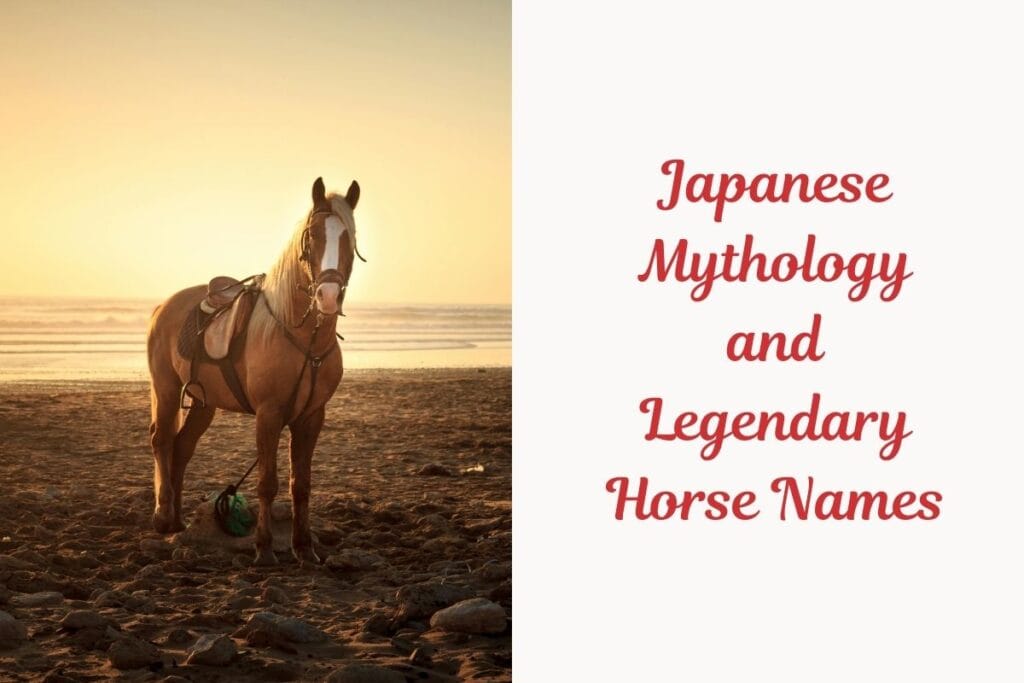
Japanese mythology and legendary horse names are deeply intertwined with the country’s rich spiritual and cultural traditions. Horses in these myths are often symbolic of strength, divine intervention, and noble qualities.
Many legendary horses are linked to gods, such as Fūjin, the god of wind, who is depicted riding a powerful steed, or Takeminakata, the god of agriculture and hunting, whose horse represents resilience and loyalty.
These mythical horses are not only seen as powerful beings but also as spiritual creatures that bridge the human and divine realms.
These names reflect attributes like grace, agility, and untamed nature, making them ideal for those seeking a name with deep cultural significance and connection to ancient stories.
1. Takeminakata
Pronunciation: Tah-keh-mee-nah-kah-tah
Meaning: “God of agriculture and farming”
Origin & usage: Takeminakata is a prominent figure in Japanese mythology. He is known as the protector of farming, agriculture, and horses. His name is often associated with strength and fertility, making it a popular choice for powerful horses.
2. Futsunushi
Pronunciation: Foo-tsu-noo-shee
Meaning: “God of warriors”
Origin & usage: Futsunushi is a deity in Japanese mythology, revered as the protector of warriors. Horses named after Futsunushi symbolize bravery and combat prowess, often associated with noble steeds.
3. Omoikane
Pronunciation: Oh-moy-kah-neh
Meaning: “Deity of wisdom and intellect”
Origin & usage: Omoikane is considered a deity in Japanese mythology who embodies wisdom and intellect. Horses named after Omoikane are seen as wise and strategic, often linked to intelligence and thoughtfulness in battle.
4. Yatagarasu
Pronunciation: Yah-tah-gah-rah-soo
Meaning: “Three-legged crow”
Origin & usage: Yatagarasu is a legendary three-legged crow in Japanese mythology, believed to guide people on the right path. Horses bearing this name are symbolic of guidance and loyalty.
5. Karasu-Tengu
Pronunciation: Kah-rah-soo Ten-goo
Meaning: “Crow demon”
Origin & usage: Karasu-Tengu are mythical creatures known for their crow-like features and martial arts skills. Horses named Karasu-Tengu often symbolize agility, fierceness, and a warrior spirit.
6. Ashinaga-Tenaga
Pronunciation: Ah-shee-nah-gah Teh-nah-gah
Meaning: “Long legs, long arms”
Origin & usage: Ashinaga-Tenaga are mythical creatures, with long limbs. The name is associated with strength and agility, and it is a fitting name for swift, long-legged horses.
7. Hachiman
Pronunciation: Hah-chee-mahn
Meaning: “God of war”
Origin & usage: Hachiman is one of Japan’s most revered gods, known as the protector of warriors. Horses named Hachiman are regarded as noble, powerful, and brave.
8. Ikutagawa
Pronunciation: Ee-koo-tah-gah-wah
Meaning: “A river that gives life”
Origin & usage: Ikutagawa, referring to a life-giving river, is symbolic of vitality and rejuvenation. This name is often given to horses that bring strength and renewal.
9. Onibi
Pronunciation: Oh-nee-bee
Meaning: “Fire spirit”
Origin & usage: Onibi is a fiery spirit in Japanese folklore, associated with mystery and power. Horses named Onibi are often linked to fiery determination and speed.
10. Suzaku
Pronunciation: Soo-zah-koo
Meaning: “Vermilion bird”
Origin & usage: Suzaku is one of the Four Symbols in Chinese and Japanese mythology, representing the southern direction. A name associated with grace, power, and resilience, ideal for swift and noble horses.
11. Byakko
Pronunciation: Bee-yahk-koh
Meaning: “White tiger”
Origin & usage: Byakko is another of the Four Symbols, representing strength and protection. Horses named Byakko are revered for their grace and strength, embodying the fierce and protective qualities of the tiger.
12. Seiryu
Pronunciation: Say-ree-yu
Meaning: “Azure Dragon”
Origin & usage: Seiryu is the azure dragon in Japanese mythology, associated with the East. Horses named Seiryu are seen as majestic and powerful, symbolizing divine protection and wisdom.
13. Kintaro
Pronunciation: Keen-tah-roh
Meaning: “Golden boy”
Origin & usage: Kintaro is a legendary child hero in Japanese folklore. His name is associated with extraordinary strength and heroic deeds. Horses named Kintaro are often regarded as champions and protectors.
14. Ikiryo
Pronunciation: Ee-kee-ree-yoh
Meaning: “Living spirit”
Origin & usage: Ikiryo are vengeful spirits of the living in Japanese folklore. Horses named Ikiryo may symbolize the untamed and unpredictable nature of the spirit world.
15. Kurozuka
Pronunciation: Koo-roh-zoo-kah
Meaning: “Black mound”
Origin & usage: Kurozuka refers to a famous place in folklore, known for its mysterious history. This name is often used for horses of dark, enigmatic qualities, embodying mystery and strength.
16. Amaterasu
Pronunciation: Ah-mah-teh-rah-soo
Meaning: “Goddess of the sun”
Origin & usage: Amaterasu is the sun goddess in Japanese mythology and a symbol of light, clarity, and life. Horses named Amaterasu are associated with brightness, hope, and vitality.
17. Izanagi
Pronunciation: Ee-zah-nah-gee
Meaning: “Creator deity”
Origin & usage: Izanagi is one of the central creator gods in Japanese mythology. This name reflects creativity, power, and the potential for new beginnings, ideal for horses with a commanding presence.
18. Raijin
Pronunciation: Rye-jeen
Meaning: “Thunder god”
Origin & usage: Raijin is the god of thunder, lightning, and storms in Japanese mythology. A horse named Raijin is often seen as powerful and fierce, with a strong, commanding presence.
19. Kagutsuchi
Pronunciation: Kah-goo-tsoo-chee
Meaning: “God of fire”
Origin & usage: Kagutsuchi is the deity of fire, symbolizing destruction and creation. Horses named Kagutsuchi are often seen as powerful, energetic, and destructive forces of nature.
20. Tengu
Pronunciation: Ten-goo
Meaning: “Mythical bird-like creature”
Origin & usage: Tengu are mythical, bird-like creatures often depicted with the ability to control the wind. Horses named Tengu symbolize speed, agility, and independence, often used for their swiftness in battle or races.
10 Funny Japanese Horse Names
Funny Japanese horse names often blend humor with creativity, reflecting the unique personalities of the horses they belong to. These names can be playful, quirky, or ironic, offering a lighthearted twist on traditional naming conventions.
Whether inspired by food, animals, or unexpected combinations, funny names add character and charm to the horses, making them memorable and amusing to owners and fans alike.
These names are often chosen to highlight a horse’s mischievous traits or endearing quirks, bringing a smile to anyone who hears them.
1. Takoyaki
Pronunciation: tah-koh-yah-kee
Meaning: A popular Japanese snack of octopus-filled dough balls.
Origin & usage: Takoyaki is a beloved street food in Japan, often enjoyed at festivals. Naming a horse “Takoyaki” brings a sense of fun and lightheartedness, highlighting the playful side of Japanese culture.
2. Pikachu
Pronunciation: pee-kah-choo
Meaning: A famous Pokémon character known for its electric powers.
Origin & usage: Pikachu is widely recognized across the world as the mascot of Pokémon. Using this name for a horse conveys energy, liveliness, and a bit of whimsy, perfect for a playful steed.
3. Sumo
Pronunciation: soo-moh
Meaning: Refers to the traditional Japanese sport of wrestling.
Origin & usage: In sumo wrestling, competitors are known for their strength and size. A horse named “Sumo” could be a playful tribute to a large and powerful animal, with an amusing contrast to its graceful nature.
4. Wasabi
Pronunciation: wah-sah-bee
Meaning: A spicy green paste served with sushi.
Origin & usage: Wasabi adds a sharp, fiery flavor to Japanese cuisine. This name for a horse suggests a fiery personality and a bold presence, adding humor in its juxtaposition with a typically calm and graceful creature.
5. Karaoke
Pronunciation: kah-rah-oh-keh
Meaning: A popular Japanese activity where people sing along to music.
Origin & usage: Karaoke is a fun, social activity in Japan. A horse named “Karaoke” would imply a spirited, entertaining horse that enjoys being the center of attention, making it a whimsical choice.
6. Sushi
Pronunciation: soo-shee
Meaning: A dish consisting of vinegared rice paired with various toppings, like raw fish.
Origin & usage: Sushi is one of Japan’s most famous dishes, symbolizing both elegance and simplicity. Naming a horse “Sushi” adds humor and lightness, ideal for a horse with a refined yet quirky personality.
7. Ramen
Pronunciation: rah-men
Meaning: A Japanese noodle soup, commonly served with meat, vegetables, and broth.
Origin & usage: Ramen is a beloved comfort food in Japan. The name would be a playful and endearing way to name a horse, evoking warmth and fun with a sense of familiarity, just like the dish itself.
8. Gyoza
Pronunciation: gyoh-zah
Meaning: Japanese dumplings are typically filled with pork, vegetables, or shrimp.
Origin & usage: Gyoza is often enjoyed with a side of dipping sauce. A horse named “Gyoza” could symbolize something small, round, and unexpected, with a humorous and adorable touch to its character.
9. Bento
Pronunciation: ben-toh
Meaning: A traditional Japanese lunchbox filled with rice, fish, and vegetables.
Origin & usage: Bento boxes are neatly packed with variety and balance. A horse named “Bento” could be a playful and charming name, implying that the horse is full of personality and character, like the diverse compartments of a bento box.
10. Ninja
Pronunciation: nee-jah
Meaning: A covert agent skilled in espionage, stealth, and combat.
Origin & usage: Ninjas are iconic figures in Japanese folklore, known for their agility and stealth. This name would suit a swift and elusive horse with a secretive nature, bringing humor through the contrast of such an agile name for a horse.
10 Buddhist influence on Japanese Horse Names
Buddhism has had a significant influence on Japanese horse names, reflecting themes of spirituality, purity, and enlightenment. Many horse names are inspired by Buddhist concepts, deities, and symbols.
For example, names like Bonten (Brahma) or Fudo (Fudo Myoo, a Buddhist protector deity) are chosen to evoke divine strength, protection, and wisdom. Horses in the Buddhist tradition are often seen as messengers or sacred beings, representing the journey toward spiritual awakening.
As a result, many Japanese horse names drawn from Buddhist teachings emphasize virtue, peace, and the connection between the material world and the divine.
1. Kannon
Pronunciation: kah-NON
Meaning: Mercy, compassion
Origin & Usage: Inspired by Kannon (Avalokiteshvara), the Buddhist deity of compassion. This name reflects the hope for a horse to embody kindness and gentleness. Often chosen for calm or nurturing horses, it’s also a symbol of spiritual guidance.
2. Shaka
Pronunciation: SHAH-kah
Meaning: Shakyamuni (another name for the Buddha)
Origin & Usage: This name pays homage to Shakyamuni Buddha, the founder of Buddhism. It symbolizes wisdom and enlightenment, making it a popular choice for strong, wise, or majestic horses in Buddhist cultural contexts.
3. Hōjō
Pronunciation: HOH-joh
Meaning: Abundance, fulfillment (a Buddhist term for spiritual prosperity)
Origin & Usage: Rooted in the Buddhist principle of spiritual wealth, this name reflects a desire for a horse to bring blessings and prosperity to its owner. It is often chosen for racing horses as a wish for success.
4. Renge
Pronunciation: REN-geh
Meaning: Lotus
Origin & Usage: The lotus flower is a sacred symbol in Buddhism, representing purity and enlightenment. This name suits a horse that stands out for its beauty, resilience, or graceful nature, connecting its spirit to serenity.
5. Satori
Pronunciation: sah-TOH-ree
Meaning: Awakening, enlightenment
Origin & Usage: Reflecting the Zen Buddhist concept of sudden spiritual insight, this name is ideal for a horse with a strong presence or a striking appearance, symbolizing clarity and understanding.
6. Myōhō
Pronunciation: MYOH-hoh
Meaning: Mystic law
Origin & Usage: Taken from the Buddhist chant “Nam Myōhō Renge Kyō,” this name represents the profound truth of the universe. Horses with this name are often seen as powerful and deeply connected to nature.
7. Kōmyō
Pronunciation: KOH-myoh
Meaning: Radiant light
Origin & Usage: This name signifies the light of wisdom and truth, a core Buddhist ideal. It is often bestowed upon horses with a luminous coat or a vibrant, energetic personality.
8. Enmei
Pronunciation: EN-meh
Meaning: Longevity, life extension
Origin & Usage: Rooted in Buddhist prayers for long life and protection, this name reflects a wish for the horse’s enduring health and vitality. It’s commonly given to horses with a calm and enduring spirit.
9. Zenryoku
Pronunciation: zen-RYOH-koo
Meaning: Full effort, wholeheartedness
Origin & Usage: Derived from Zen Buddhist teachings about mindfulness and complete dedication, this name is ideal for a hardworking and determined horse, especially in racing or competition.
10. Nyorai
Pronunciation: NYOH-rye
Meaning: Buddha, enlightened one
Origin & Usage: A title for the Buddha, this name emphasizes divine wisdom and peace. It’s a fitting choice for a majestic or serene horse, reflecting its noble and composed demeanor.
Exploring the Influence of Buddhism on Japanese Culture and Its Impact on Horse Naming
Buddhism has had a profound impact on Japanese culture, shaping everything from art and philosophy to daily customs and naming practices.
Introduced to Japan around the 6th century, Buddhism quickly integrated into the Japanese way of life, intertwining with the indigenous Shinto beliefs and leading to a unique blend of religious and cultural practices that continue to thrive today.
Japanese horse naming, like other cultural practices, has also been influenced by Buddhism. Horses hold a respected place in Japanese history, particularly in religious and military contexts, and they were once considered sacred animals with connections to the gods.
Many names inspired by Buddhist concepts are chosen to reflect the values associated with these animals—such as strength, compassion, wisdom, and tranquility.
Buddhist Values Reflected in Horse Names
1. Compassion and Kindness: Compassion, a core value in Buddhism, is represented by figures like Kannon, the Bodhisattva of Mercy. Horses named after Kannon or similar figures are often seen as gentle and kind, evoking a calming, protective spirit. Choosing names that reflect compassion may also signify the owner’s wish for the horse to bring peace and comfort to those around it.
2. Wisdom and Enlightenment: Names inspired by Buddhist concepts of wisdom and enlightenment, such as Bodhi (enlightenment) or Satori (awakening), carry deep philosophical meaning. These names are often given to horses perceived as intelligent, calm, or perceptive. In Zen Buddhism, achieving enlightenment involves understanding one’s true nature, which is reflected in these names.
3. Strength and Protection: Some Buddhist figures are protectors of travelers, children, or the sick, and their names are associated with protection and guidance. For example, Jizo (地蔵) is a bodhisattva known for protecting travelers and children. Naming a horse Jizo could suggest a strong, protective character, suited for a loyal horse that stays close to its family or shows great resilience.
4. Peace and Tranquility: Peaceful names, like Anjin (安心, “peaceful mind”) or Zen (禅, “meditation”), emphasize calmness and tranquility, core aspects of Buddhist practice. Horses with such names might be known for their calm temperament, making them ideal for therapeutic or companion horses.
5. Nature and Harmony: In Buddhism, harmony with nature is fundamental, symbolizing the interconnectedness of all beings. Many names reflect this connection, using words like Shinko (真光, “true light”) or Myoko (妙光, “mystic light”), which speak to the natural beauty and harmony that Buddhism reveres. Such names often suit horses known for their beauty, poise, and the calming effect they have on their surroundings.
Buddhist Themes in Japanese Horse Naming Practices
Japanese names often reflect Buddhist teachings about life’s impermanence, the importance of compassion, and the pursuit of enlightenment. By choosing names based on these values, horse owners can express their admiration for Buddhism’s principles and their hopes for the horse’s role. For example:
- Names Representing Enlightenment: Names like Bodhi and Satori are chosen to symbolize wisdom and the journey toward inner understanding, a reflection of Buddhist pursuit.
- Names Reflecting Nature: Many Buddhist names for horses incorporate elements of nature, such as Hoshi (星, “star”) or Tsuki (月, “moon”), symbolizing beauty and serenity.
Symbolism and Purpose Behind Buddhist Names for Horses
Using a Buddhist-inspired name can give a horse an almost sacred significance. Horses were once viewed as sacred animals in Japan, especially in relation to Shinto shrines and Buddhist temples, where they were believed to be messengers of the gods. Naming a horse with a Buddhist term connects it to those ancient beliefs and honors the horse’s role as a companion, worker, or symbol of natural harmony.
For horse owners who value Buddhism’s teachings, these names represent more than just words—they embody aspirations for the horse’s behavior and qualities, linking their companion to virtues such as loyalty, serenity, and strength.
8 Tips for Choosing Japanese Horse Names
1. Focus on Meaning: Japanese names often carry deep meanings. Choose one that reflects your horse’s personality, like Kaze (wind) for speed or Hikari (light) for energy.
2. Match to Appearance: Use names that align with physical traits, such as Kuro (black) for a dark coat or Yuki (snow) for a white coat.
3. Draw from Nature and Culture: Names like Sakura (cherry blossom) or Raiden (thunder) capture Japanese natural and cultural beauty.
4. Consider Historical or Mythological Names: Names like Susanoo (god of storms) add a sense of legend and strength.
5. Reflect Personality Traits: Pick names that fit unique traits, like Hana (flower) for playfulness or Anshin (peaceful mind) for calmness.
6. Keep It Simple: Short, easy names like Kai (sea) or Zen (meditation) are practical for daily use.
7. Explore Seasonal & Buddhist Influences: Names like Aki (autumn) or Myoho (Mystic Law) add depth.
8. Choose with Personal Connection: Select a name that resonates with you, whether it’s cultural, personal, or simply a favorite.
